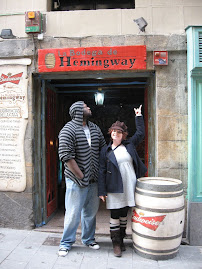I've been thinking more about the means of rhetorical agency as it relates to autism representation and the rhetoric of autism online, particularly in youtube and online blogs. In one comment on autismvox, anonimouse comments in regard to the representation of parents of autistics as martyrs ready and waiting for their pity party. The commenter is specifically discussing how such representations make it seem okay to harm one's autistic child:
…The big problem is that some parents have convinced themselves that they are martyrs at the throne of something they can’t control. (or in many cases, was thrust upon them by evil drug companies) And once you get that thought in your head, you can justify all sorts of questionable things to do to your kid…
I found this statement particularly interesting in regard to the rhetoric of agency--or in this case, the (perceived) lack thereof. Again, someone/thing has to be blamed for a person's autism. Either the drug companies, the government, the environment, or the parents who just "accept" autism without fighting to do something about it. Without agency, there's despair and despondency. No hope because there's nothing that can be done. No one to be held accountable. All of which leads, unfortunately, some parents to murder (Katherine McCarron, Brandon Williams, Marcus Fiesel, Ulysses Stable are just a few autistic children--all under 10--who were murdered by their caregivers because they were autistic).
I also think this lack of agency is represented in the Autism Speaks video, in which mothers of autistic children discuss the hopelessness and challenges of raising an autistic child. Aside from the obvious financial motivations for the video, the video does illustrate the despair that comes from lack of agency, as in the case of the mother talking about driving herself and her daughter off of the George Washington Bridge. It's interesting the importance of doing something. Act.
Just some thoughts...
Friday, March 23, 2007
Subscribe to:
Post Comments (Atom)








1 comment:
I love this post!
I'm fascinated by questions of agency. Most of my thinking about agency though has been in relation to folks doing work in various progressive movements -- agency in activism. How do they (we -- I'm among them) cultivate, relinquish, or are denied agency. In particular, I'm concerned with how movements for social justice use those directly affected by whatever policy, program, situation it is they are against solely for movement leaders' own purposes without providing a space for those "on the front lines" as it were to deal with, wrestle with, determine for themselves how they can or if they should draw on their experiences in the service of the given movement. More specifically, take the death penalty abolition movement. There, the most powerful tools in the abolitionist's cache are the stories of murder victims' family memebers and persons exonerated from death row. Now, in my estimation, in order for abolitionists to win their's should be a victims-centered movement. Meaning they should not say all the time, "Poor offender," but rather, "How can we best help faciliate an active open healing process for all those touched by the awful violence of murder?"
I seem to be wandering, but here's the thing, murder victim's family members and exonarees ought not simply to be dragged out in order to parade their trauma for gathered audiences so the movement can have a win. They need to be allowed a space for their own healing and have some kind of voice in how their expereince can best bring about the goal of a less violent culture.
Post a Comment